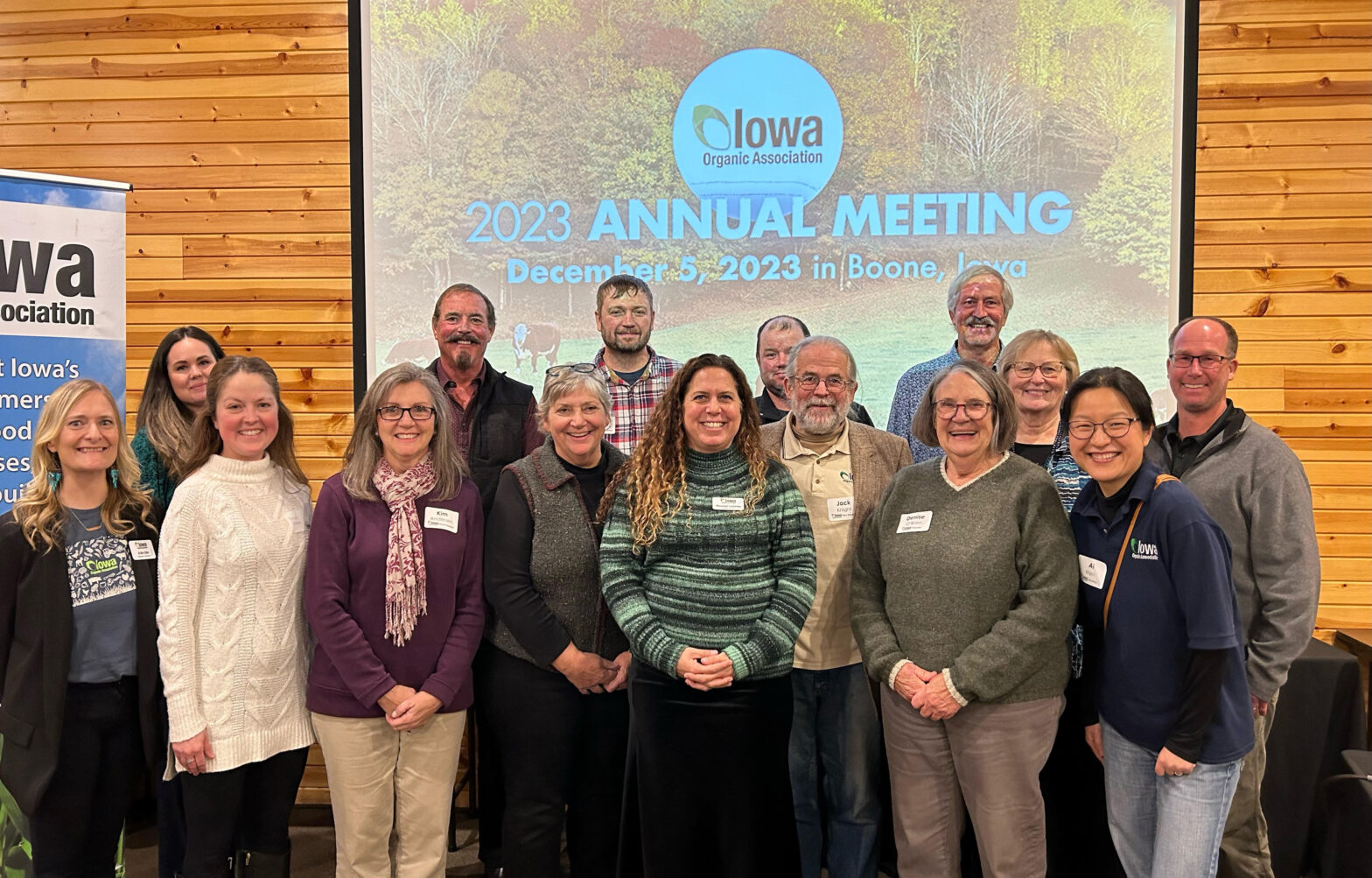Partner Q&A with:
Roz Lehman
Iowa Organic Association
Des Moines, Iowa
Please tell us about the mission of your organization and what brought you personally to this work.
Since 2006, the Iowa Organic Association has been leading efforts across the state to provide Iowa’s organic community with the expertise, resources, and support needed to succeed in the organic industry. Our membership is a diverse community committed to advancing organic agriculture and foods systems in Iowa. IOA has developed valuable relationships with farmers, landowners, industry experts, stakeholder partners, policy leaders, and consumers who champion IOA mission and programs.
Roz Lehman, executive director, has a 25-year career in non-profit advocacy and community organizing roles. She was drawn to the Iowa Organic Association by her desire to provide her family and community safe food and promote farm practices that prioritize a healthy environment. Since joining IOA in 2018, Roz has worked with the organic community to develop programs and resources to support a growing organic community in Iowa.
How would you describe the vision and goals of your organization?
IOA is committed to expanding organic production in Iowa through education, outreach, advocacy, and community building efforts. Much of IOA’s work prioritizes education and outreach activities to provide resources and support for farmers interested in organic transition or diversification, and others seeking information about organic standards, practices and products. These activities include field days, webinars, technical workshops, college and university presentations, and attending farm conferences and local events.
IOA works to connect local, state, and federal policy leaders to issues important to the organic community, such as strengthening organic enforcement, technical support and financial resources, organic markets, and production challenges (i.e. drift, seed availability, etc.), to increase awareness, funding and support for organic programs and practices.
IOA continues to expand our network of farmers, landowners, industry experts, stakeholder partners, policy leaders, and consumers to provide resources, share experience, and foster fellowship. IOA’s staff and board have strong systems and processes that help coordinate relationships, referrals and rapport within Iowa’s organic community.
What TOPP related programming are you creating at your organization?
Support from USDA OTI and TOPP will help IOA fill a much-needed gap in Iowa for greater organic technical support and resources. IOA has hired an Organic Farm Advisor, a new role for IOA and in the state of Iowa, to provide point-of-contact support for Iowa farmers looking for resources and guidance about organic transition and production. Additionally, the Organic Field Advisor will be responsible for leading the Organic Mentorship Program and conducting education and outreach to increase farmer knowledge and confidence in organic production.
Planned TOPP activities include leading an Organic Mentorship Program to connect seasoned organic producers with new or transitioning producers – providing the support and guidance needed in navigating a new production system. In addition to mentorship, IOA will be developing a range of in-person and virtual activities (field days, webinars, workshops, coffee chats, college and university presentations, and outreach at regional farm conferences and community events) to increase awareness about organic, the NOP and organic standards, address common production questions, promote new research and resources, and foster regional and local connections to help grow Iowa’s organic community.
Which TOPP priority area are you most excited about as it relates to the work of your organization and the
needs of your region?
IOA is excited to offer Iowa’s organic community a dedicated staff person to assist with technical support in their organic journey – whether it’s an established, certified producer, a new producer exploring organic options, or anyone looking to learn more about the organic movement. We hope that this extra level of support can provide the direction and resources needed to succeed in the organic industry and increase organic production in Iowa and across the U.S.
Please share a recent success related to this programming.
Coffee Chats in Northeast Iowa. Susana Cabrera-Mariz, IOA’s organic farm advisor, joined farmers from Northeast Iowa (Allamakee County) on Wednesday, February 21st at the local community center to introduce the TOPP Organic Mentorship Program and discuss questions related to the NRCS Organic Management Standard 823. Nearly 40 farmers gathered to offer support and discuss a range of organic issues.
The meeting included a brief presentation and listening session where farmers shared their organic- related concerns, hopes, and questions. This NE Iowa farmer coffee chat is coordinated by Gary Welsh of Welsh Family Organic Farms. Gary is an Organic Valley dairy farmer and has been farming organically for over 50 years in Iowa; he is also a TOPP mentor and enjoys providing guidance to help farmers interested in organic production.
What unique challenges do you face in your region in terms of growing organic acreage?
Most of Iowa’s organic farmers grow corn, soybeans, and small grains. Organic row crop farmers are particularly susceptible to shifts in the organic market and this year they are experiencing a sharp decrease in organic corn sales. The dramatic changes in market organic markets can de-incentivize organic farmers from maintaining their organic certification or transitioning into organic.
If you could fast forward to 2027 and the end of the five year TOPP program, what do you envision? What
do you hope we’ve accomplished?
By 2027, IOA is hopeful that OTI and TOPP will generate greater awareness about organic opportunities and benefits; increase organic production and acres in Iowa; identify new market opportunities; boost organic sales; and expand community and resources to strengthen local and regional organic networks.
